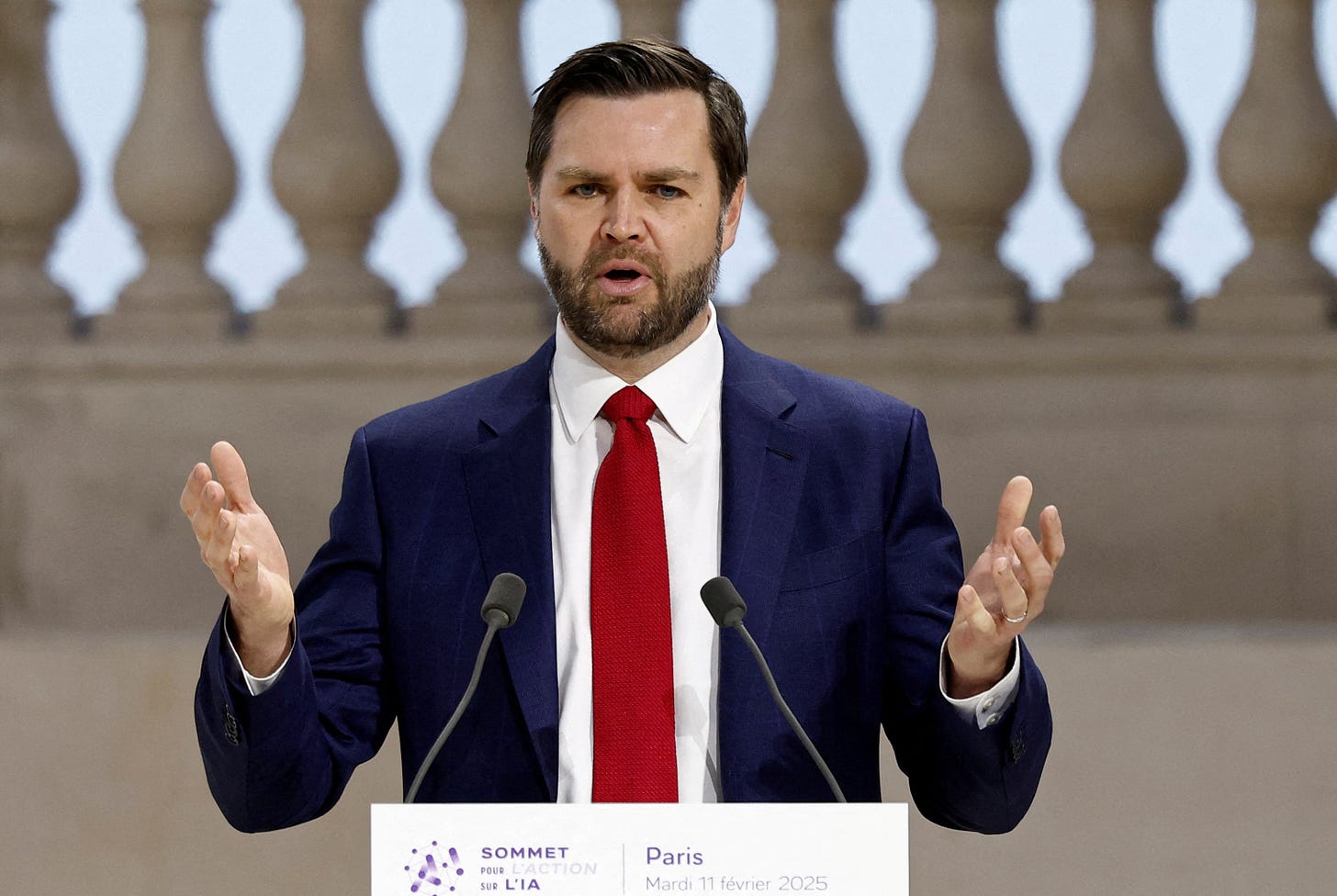Yesterday, JD Vance spoke at the AI Action Summit. In prior weeks, I was asked by several people in industry what I would like to see. JD exceeded all expectations and pointed to the three most threatening dynamics in the AI market.
Here’s how he began the speech:
I'm not here this morning, uh, to talk about AI safety, which was the title of the conference a couple of years ago. I'm here to talk about AI opportunity. When conferences like this convene to discuss a cutting edge technology, oftentimes I think our response is to be too self conscious, too risk averse.
But never have I encountered a breakthrough in tech that so clearly calls us to do precisely the opposite. Our administration, the Trump administration, believes that AI will have countless revolutionary applications in economic innovation, job creation, national security, healthcare, free expression, and beyond.
And to restrict its development now will not only unfairly benefit incumbents in the space, it would mean paralyzing one of the most promising technologies we have seen in generations.
Vance is exactly right. The Biden administration’s AI policy was heavily influenced by the AI Safety movement, a movement almost entirely funded by billionaires Sam Bankman-Fried and Dustin Moskovitz. They expressed in no uncertain terms that they should “pause AI research” because they believed AI would cause “human extinction”.
Many people have asked me about the involvement of top AI companies in pushing this “Doomsayer” narrative. When I have explained the true extent of collusion, people are often skeptical. The mood is now shifting. People are reckoning with the degree of corruption and misdirection in AI policy. Later on in his speech, Vance hits the nail on the head:
I'd ask if you step back a moment and ask yourself, who is most aggressively demanding that we, meaning political leaders gathered here today, do the most aggressive regulation?
It is very often the people who already have an incumbent advantage in the market. And when a massive incumbent comes to us, asking us for safety regulations, we ought to ask whether that safety regulation is for the benefit of our people or whether it's for the benefit of the incumbent.
The SBF Strategy
Let me be completely unabashed about what was happening. During the Biden administration, Sam Bankman-Fried and his crypto trading firm FTX pioneered what I call the “SBF strategy”. The SBF strategy is to go in front of congress, advocate for aggressive regulation, particularly industry-influenced regulators and licensors. The goal of the SBF strategy is twofold: direct regulation away from policy that harms incumbents and towards policy that harms competitors. The worst part is, he would’ve gotten away with it if his firm didn’t go bankrupt. That’s the main takeaway Effective Altruists have from SBF’s downfall. Unfortunately, it also happens to be true.
What does crypto policy have to do with AI? The ties are very clear. Before the collapse of FTX, SBF was the largest sponsor of the AI Safety movement directing Biden’s policy. Court filings show Bankman-Fried was a major investor in Anthropic, the AI firm which has most aggressively advocated for “AI Safety” policies and regulators like the AI Safety Institute. It is rumored that Bankman-Fried was a mentor to Anthropic CEO Dario Amodei. What we know for sure is that he was Anthropic’s lead Series B investor.
In crypto, the SBF strategy died with his arrest and conviction. But it lived on in AI policy. After the collapse, AI Safety’s #2 billionaire Dustin Moskovitz picked up the tab for the exact same organizations Bankman-Fried helped start. From the perspective of anyone outside the movement, there is no distance between their beliefs. That is why there is a symbiotic relationship between NGOs calling for the most aggressive AI regulation and a major AI company.
In short, JD Vance was right. Reality backs up his statement in a way that is stronger than anything people outside of the AI industry can imagine.
Another area that Vance nails is the subversion of American companies to foreign regulators:
The Trump administration is troubled by reports that some foreign governments are considering tightening the screws on U.S. Tech companies with international footprints now. America cannot and will not accept that.
And we think it's a terrible mistake, not just for the United States of America, but for your own countries. The U.S. Innovators of all sizes already know what it's like to deal with onerous international rules. Many of our most productive tech companies are forced to deal with the EU's Digital Services Act and the massive regulations it created about taking down content and policing so called misinformation.
Like the previous example, it is difficult to overstate the degree to which Vance’s words are true and, if anything, underestimating the extent of subversion.
The US had previously had a policy of entering joint partnerships with foreign regulators and directing US companies to comply with foreign regulatory authority that they did not have at home. This will sound familiar to those working in social media, surveillance, and “disinformation”. What the Biden administration was unable to do to American citizens under its own authority, it did under the authority of our allies. Moreover, those EU and UK offices may have been illegally lobbying American state and federal lawmakers.
Due to the influence of SBF and Moskovitz, the EU and UK have engaged with the US in ways that actively harm our AI industry’s competitiveness to China’s benefit. With Trump and Vance in power, that changes now.
As I wrote in January for Pirate Wires:
Biden’s original executive order subjected American companies to global AI governance. Specifically, the EU and UK targeted Americans, both by targeting American companies with their laws and attempting to influence American AI policy. Having failed to produce leading AI companies of their own, they have resorted to controlling AI’s future by censoring and controlling American-made AI models.
This must end on day one. Every foreign AI partnership must be oriented towards European obedience to American standards and technologies, not the other way around. Foreign governments should not be given special access to American algorithms, data, or products unless they intend to advance American interests, rather than slow them down. Joint research programs, data-sharing agreements, and policy committees must be contingent on improving AI research and access, not restricting it.
I am confident that the Trump administration will withdraw from or renegotiate AI treaties to put Americans first. Ahead of the US’ new AI action plan, Vance gives a shoutout to little tech and the importance of startups in generating new innovations.
Now, this administration will not be the one to snuff out the startups and the grad students producing some of the most groundbreaking applications of artificial intelligence. Instead, our laws will keep big tech, little tech and all other developers on a level playing field. Now, with the president's recent executive order on AI, we're developing an AI action plan that avoids an overly precautionary regulatory regime, while ensuring that all Americans benefit from the technology and its transformative potential.
This dynamic was crucial to Chinese firm DeepSeek’s recent algorithmic improvements.
Amazing things are happening. Hopefully, we can get back on track and continue the long arc of American technological dominance. We will continue to depend on little tech and open source for those innovations.
Donald Trump, JD Vance, David Sacks, Michael Kratsios, Sriram Krishnan, and many others in the new administration are expanding the overton window of what is possible and what truths can be openly discussed. We are beginning to fully uncover and reckon with what actually happened to AI under the previous administration.




"Let me be completely unabashed about what I believe was happening. During the Biden administration, Sam Bankman-Fried and his crypto trading firm FTX pioneered what I call the “SBF strategy”. The SBF strategy is to go in front of congress, advocate for aggressive regulation, particularly industry-influenced regulators and licensors. The goal of the SBF strategy is twofold: direct regulation away from policy that harms incumbents and towards policy that harms competitors."
Great observation here, but this is not particularly new (although it may be to the crypto and AI spaces). This is, unfortunately, a fairly common business practice in many industries, and is usually considered part of "regulatory capture" (where a regulatory agency prioritizes the interests of the industry its regulating). Often, a regulatory agency is 1) staffed with ex-industry folks, which makes some sense, practically, because they're familiar with it, 2) the regulatory agency seeks input from the big players in the industry and uses that input as a guiding light (or alternatively, take bribes and do the big players' bidding), and 3) assumes/pretends good faith by those big players. What usually happens is similar to the "SBF strategy" - the industry giants convince a regulatory agency that costly regulation is needed - which, conveniently, only the big players can afford - which has the intended by-product of driving competitors out of their space, because start-ups can't, for instance, pay for a giant compliance team or the consulting fees or whatever to comply. The big players take a hit to their expenses, but get threatening, fresh players out of the market.
A helpful and more bipartisan perspective...on regulation